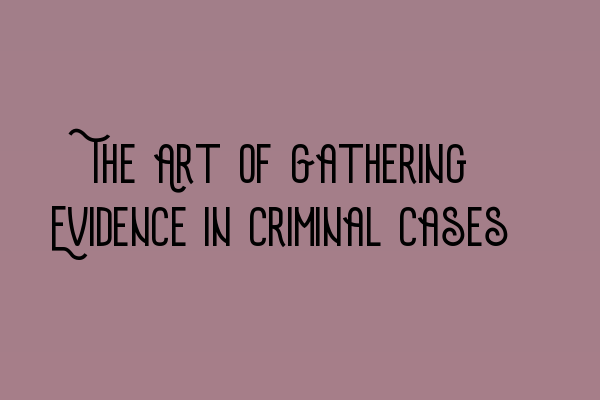The Art of Gathering Evidence in Criminal Cases
Welcome to SQE Criminal Law & Practice Law UK. In this article, we will explore the art of gathering evidence in criminal cases. Gathering strong and admissible evidence is crucial for building a solid criminal defense strategy. It requires a systematic approach and a keen eye for details.
The Importance of Gathering Evidence
Building a strong case starts with gathering evidence. It allows lawyers to be fully prepared and armed with the necessary information to defend their clients effectively. Evidence can help establish facts, discredit unreliable witnesses, and challenge the prosecution’s case.
However, gathering evidence is not a simple task. It requires careful planning, thorough investigation, and a comprehensive understanding of the legal system. Let’s dive into the key steps involved in the art of gathering evidence in criminal cases.
Step 1: Identifying Relevant Evidence
The first step is to identify the types of evidence that are relevant to the case. This can include witness statements, physical evidence, expert opinions, digital evidence, and more. Each case is unique, so it’s important to have a clear understanding of the specific evidence needed to build a strong defense.
For instance, in a case involving financial fraud, it would be crucial to gather bank records, transaction receipts, and any other relevant financial documents. On the other hand, in a murder case, physical evidence such as DNA or fingerprints might play a vital role in proving innocence.
Step 2: Conducting Investigation
Once the relevant evidence is identified, the next step is to conduct a thorough investigation. This involves interviewing witnesses, reviewing documents, collecting physical evidence, and utilizing forensic techniques when necessary. It’s important to approach the investigation with objectivity and ensure that all leads are explored.
During the investigation process, it’s crucial to document all findings in a systematic manner. This documentation will serve as a reference and may be crucial during trial preparation and presenting the case in court.
Step 3: Adhering to Legal Standards
Gathering evidence is not just about collecting any information related to the case. It’s essential to adhere to legal standards to ensure that the evidence collected is admissible in court. It must be obtained legally and ethically, without violating any privacy rights or constitutional protections.
As legal professionals, it is our duty to uphold the integrity of the justice system. This means following proper legal procedures, obtaining necessary permissions, and ensuring that evidence is obtained in a law-abiding manner.
Step 4: Analyzing and Presenting Evidence
Once all the evidence is gathered, it’s time to analyze and organize it in a way that strengthens the defense strategy. This involves identifying key elements, establishing relationships between different pieces of evidence, and debunking any inconsistencies or contradictions.
In court, the gathered evidence must be presented in a clear and concise manner to compel the judge and jury. Effective communication skills and the ability to present complex information in understandable terms are crucial.
Conclusion
Gathering evidence in criminal cases is an art that requires a combination of legal knowledge, investigative skills, and attention to detail. It is essential for building a robust defense and ensuring a fair trial for our clients.
If you need expert legal representation for Delaware LLCs in the UK, our team at SQE Criminal Law & Practice Law UK can guide you. We also provide articles on ensuring ethical business practices in Delaware, legal challenges for UK businesses in the U.S., and an in-depth analysis of the British legal system. Feel free to explore our related articles:
- Legal Representation for Delaware LLCs in the UK: Expert Advice
- Ensuring Ethical Business Practices: Delaware’s Code of Conduct
- Legal Challenges for UK Businesses in the U.S.: Strategies for Overcoming Hurdles
- UK Criminal Law: An In-Depth Analysis of the British Legal System
- Legal Challenges for UK Businesses in the U.S.: Strategies for Overcoming Hurdles
For any legal assistance or to learn more about criminal law and practice in the UK, don’t hesitate to reach out to us at SQE Criminal Law & Practice Law UK. We are here to ensure your rights are protected.
